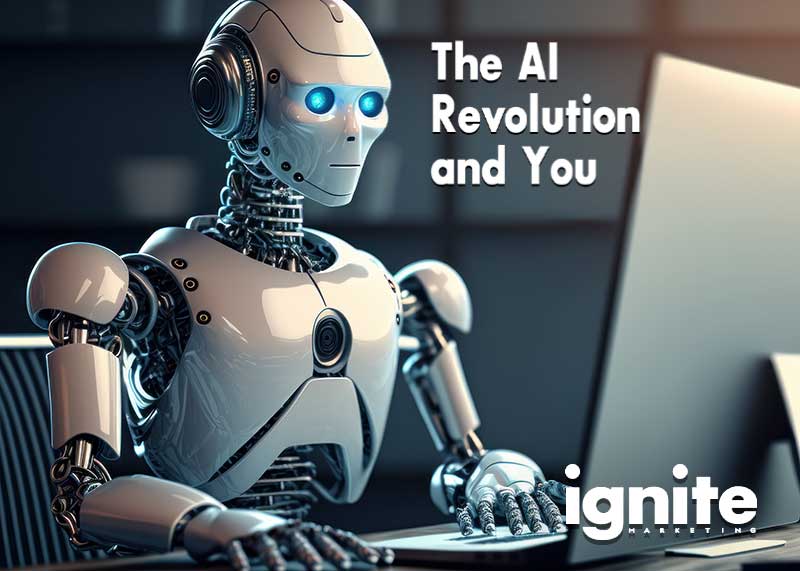In today’s fast-paced digital world, artificial intelligence (AI) is revolutionizing how brands interact with their customers. It’s reshaping the landscape of online and digital marketing, promising unprecedented efficiency and personalization capabilities. Streaming services like Netflix, Hulu, and Disney+ use AI algorithms to analyze viewer histories and preferences, allowing the platforms to recommend shows and movies tailored to each user’s tastes. Amazon leverages predictive analytics to suggest products to users based on their browsing and purchase history. Even news organizations like the Associated Press and Forbes use AI to generate news stories and content pieces about financial reports, sports results, and other data-driven topics.
However, as with any buzzy technology, it’s essential to weigh both the opportunities and challenges it presents. Whether you’re a marketer, business owner, SEO specialist, marketing manager, or ad buyer, understanding the pros and cons of AI in your field can help you leverage its power wisely.
The Advantages of AI in Digital Marketing
Enhanced Personalization
AI algorithms analyze huge volumes of data on consumer behavior, allowing marketers to deliver content that’s tailored to individual preferences. This level of personalization enhances the user experience, helping to keep your audience and users engaged and potentially boosting sales and conversion rates.
Automated Customer Interactions
From chatbots that offer 24/7 customer service to personalized email marketing campaigns triggered by specific actions, AI automates interactions that would otherwise require significant human resources. This not only reduces costs but also improves response times and customer satisfaction. Email and SMS tools like Mailchimp or Constant use AI to optimize email marketing campaigns, determining the best times to send emails and segmenting users based on their interaction patterns. Once engaged, AI-powered chatbots can answer customer queries, assist with purchases, and provide personalized recommendations, all in real-time. Some chatbots are so advanced that they can pass the so-called Turing Test, named after the pioneering computer scientist Alan Turing, being virtually indistinguishable from a live person to the user.
Predictive Analytics
AI excels in predicting future consumer behavior by analyzing past interactions. Marketers can use these insights to refine their strategies, anticipate market trends, and make informed decisions about product developments, SEO, and content marketing efforts. As mentioned above, Amazon and other large online retailers use AI to suggest products to users based on their browsing history and purchases, significantly increasing conversion rates and customer retention by making relevant, timely product suggestions. Many brick-and-mortar retailers also use memberships, emails, and phone numbers to track purchase habits and provide customized suggestions and deals to individual customers.
Elevated Content Creation
AI-powered tools assist in creating high-quality, SEO-optimized content more efficiently. From generating article drafts to suggesting improvements for better readability and search engine ranking, AI can be a valuable co-pilot for content creators. In fact, some of this blog article was written with AI assistance, but can you tell what is and what isn’t the creation of a human mind?
Efficient Ad Targeting and Buying
AI enhances the precision of ad targeting by processing vast amounts of data to identify the most lucrative opportunities. Programmatic ad buying, powered by AI, automates the purchase of ad space, ensuring ads are placed where they’ll generate the most impact. Combined with human input and direction, this can significantly increase the effectiveness of advertising and decrease the cost per lead, click, or call needed to generate new sales and sales opportunities.
The Challenges of AI in Digital Marketing
Ethical Concerns and Privacy Issues
The extensive data collection and analysis involved in AI-driven marketing raise concerns about consumer privacy. More and more in recent years, this has become a significant concern to users. No one likes feeling that their every online move is being tracked — even if it is — and nearly everyone with an email knows what it’s like to have their email address sold and their inbox spammed with unwanted emails, newsletters, and offers. Businesses must tread carefully, ensuring they comply with data protection regulations and maintain customer trust.
Loss of the Human Touch
While AI can mimic human interactions to a certain extent, it lacks the genuine empathy and understanding that come from human customer service and content creation. Remember the Turing Test mentioned above? Not all AI can pass that test. This can result in experiences that feel impersonal or fail to truly connect with consumers on an emotional level.
Over-Reliance on Automation
There is also a risk of becoming too dependent on AI, leading to decreased human oversight and potential errors. AI systems can sometimes make mistakes in data interpretation or automated actions, which can harm a brand’s reputation if not promptly addressed. AI tools aren’t infallible, and unlike human beings, they don’t know or care when they make a colossal blunder.
Initial Costs and Resource Allocation
Implementing AI in digital marketing strategies can involve significant initial investments in technology and training. Businesses must evaluate whether the potential ROI justifies these costs, particularly small and medium-sized enterprises with limited budgets. Additionally, it’s important for these organizations to explore scalable AI solutions that offer flexibility to grow with their business. Ultimately, the goal is to make well-informed decisions that align with a business’s objectives and finances, ensuring that the investment into AI drives tangible value and competitive advantage in the digital marketing landscape.
Keeping Pace with Rapid Evolution
The field of AI is advancing at lightning speed, requiring marketers to continually update their knowledge and tools. Staying competitive may demand ongoing investments in technology upgrades, software licenses, and employee training. This dynamic environment necessitates a commitment to continuous learning and flexibility, as the tools and techniques that are cutting-edge today may become obsolete tomorrow. Staying ahead in this fast-evolving field requires a strategic approach to technology adoption and a culture that values ongoing education and innovation.
Summing It All Up
AI in online and digital marketing offers tantalizing possibilities for efficiency, personalization, and data analysis. Yet, it also presents new challenges, from ethical considerations to the potential for over-automation. For businesses and marketers, success lies in finding a balanced approach that leverages AI’s strengths while remaining vigilant about its limitations. By doing so, you can harness the power of AI to not only meet but exceed your marketing objectives in this digital age. Contact us to see how Ignite Marketing can help you harness the power of AI.

